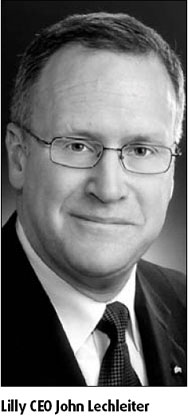Lilly's new top man prefers thinking on his feet
John Lechleiter could pick any mode of transportation he wants for his commute to the executive suite at Eli Lilly and Co. Most days, he chooses his feet.
Lechleiter walked briskly through the lobby of his downtown condo on a recent morning, towing a briefcase and attache into the pre-dawn darkness.
His mile-plus walk took him through a railroad underpass occasionally frequented by the homeless.
Lechleiter, 54, likes to use these walks to think and clear his mind. He has plenty to ponder these days.
The Harvard-trained chemist takes over as Lilly's CEO on April 1, succeeding Sidney Taurel, 59, who is retiring. Lechleiter inherits a Fortune 500 company that earned nearly $3 billion last year but will lose patent protection for its best-selling drug, the anti-psychotic Zyprexa, in three years.

Meanwhile, the drugmaker is battling a slumping stock price and, like other pharmaceutical companies, faces growing government regulation and competition from generic products.
Lilly also has had to pay more than $1 billion to settle hundreds of pending claims alleging it downplayed Zyprexa's side effects and pushed the drug for unapproved uses, charges the company denies.
Lechleiter will be watched closely by Wall Street analysts who have grown impatient waiting for his company to produce new drugs. But he's anxious to take over.
Lechleiter, most recently the company's chief operating officer, becomes Lilly's ninth leader in 131 years, capping a career that began nearly 30 years ago in research labs and wound through sales and marketing.
The new CEO will make an annual salary of $1.4 million.
He is also eligible for a bonus of around $2 million, depending on the company's performance.
His journey to the top is deeply rooted in the lessons he learned growing up as the oldest of nine children in Louisville, Kentucky.
Lechleiter remembers the excitement he stirred at home when he won a $300 scholarship to cover a year's tuition to Saint Xavier High School in Louisville.
"My mother told me later that was the greatest day of my dad's life because he really hadn't quite figured out how he was going to swing that, knowing that there were eight others coming behind," he said.
Lechleiter shared the attic of their family home, which his dad refurbished, with four brothers. Food never stuck around long.
"Dinner was served, breakfast was served and lunch was served," he said. "But the cookies were gone."
A large family taught Lechleiter how to negotiate, cooperate and get along with others. It also taught him the importance of education.
Agencies
(China Daily 04/01/2008 page17)














